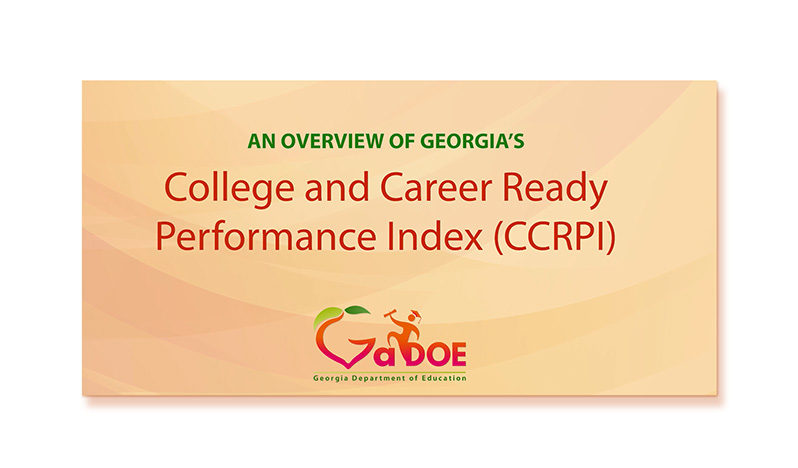
The Georgia Department of Education this week released the 2022 College and Career Ready Performance Index (CCRPI) reports.
Under a waiver received from the U.S. Department of Education, the 2022 CCRPI does not include an overall, 0-100 score for schools, districts, or the state, and additional modifications were made to account for data limitations resulting from the pandemic.
About the 2022 CCRPI Reports
Today’s reports include scores for three CCRPI components:
- Content Mastery includes student scores on state assessments in English Language Arts, mathematics, science, and social studies. No changes were necessary compared to the 2019 calculation.
- Readiness at the elementary- and middle-school levels includes literacy scores and data on the percentage of students passing “Beyond the Core” instruction. Beyond the Core at the elementary level includes fine arts, world language, and computer science, and at the middle school level fine arts, world language, physical education/health, career exploratory, and computer science. At the high-school level, Readiness includes literacy scores, pathway completion data, and accelerated enrollment data.
- Graduation Rate is reported at the high-school level.
While the Readiness component typically includes student attendance at all grade levels, the U.S. Department of Education approved Georgia’s request to remove this indicator for 2022, given the impact of illness and quarantines. Additionally, College and Career Readiness – which is typically included in the high-school Readiness score – is not included due to incomplete data.
As outlined in Georgia’s waiver request, the Progress and Closing Gaps indicators were not calculated for 2022 due to data limitations resulting from the pandemic. 2022 results will be used to set new baselines for these indicators. English learners’ progress toward English language proficiency is reported.
State-Level Component Scores — 2022
While a direct comparison to 2021 is not available since Georgia and other states were not required to calculate federal accountability reports, Georgia Milestones scores (upon which the Content Mastery component is based) largely increased from 2021 to 2022. (Some data from 2020 and 2021 is available, but is not calculated into a 0-100 score.)
Georgia’s Focus on Academic Recovery
In response to the pandemic’s impact on student learning, GaDOE has partnered with schools and districts to make strategic investments in academic recovery. Those investments include:
- Hiring state- and regional-level Academic Recovery Specialists who work directly with school leaders and educators to address gaps in learning
- Awarding grants to expand afterschool and summer learning
- Providing formative assessments at no cost to all districts and schools
- Developing an extensive library of publicly available instructional resources and supports
- Establishment of an Office of Rural Education and Innovation to target supports to underserved schools and districts
“Georgia will continue to remain laser-focused on academic recovery,” State School Superintendent Richard Woods said. “We know the pandemic had an undeniable impact on student learning – it’s our role, responsibility, and privilege moving forward to ensure districts and schools have the resources they need to continue investing in students and combatting the effects of lost learning opportunities. Georgia’s teachers, students and the rest of our public education family have already worked incredibly hard to get learning back on track, and I am entirely confident in their ability to continue those efforts.”
About the CCRPI
Under the federal Every Student Succeeds Act (ESSA), each U.S. state is required to have a “statewide accountability system” that provides information on how well schools are performing. The CCRPI meets that requirement in Georgia.
Georgia, along with other states, requested and received approval to pause accountability reporting in 2020 and 2021 due to the impacts of the pandemic. In 2022, the U.S. Department of Education invited each state to submit an addendum to its state ESSA plan outlining one-year modifications to its accountability plan as a result of pandemic-related data limitations. Georgia’s addendum request was approved in May 2022.


Chattooga Opinions
Medically Supervised Weight Loss: Inside Premier Weight Loss & Medispa

Chattooga Local News
Georgia Power Files Plan for Customer Rate Decrease with Public Service Commission

Chattooga Local Government
Carr Pushes for Permanent Halt of Medicare and Medicaid Funding for Child Sex-Change Procedures

Bulloch Public Safety
02/20/2026 Booking Report for Bulloch County

Bulloch Public Safety
01/26/2026 Booking Report for Bulloch County

Bulloch Public Safety
02/09/2026 Booking Report for Bulloch County

Bulloch Public Safety
02/16/2026 Booking Report for Bulloch County

Bulloch Public Safety
02/02/2026 Booking Report for Bulloch County

Bulloch Public Safety
01/30/2026 Booking Report for Bulloch County





